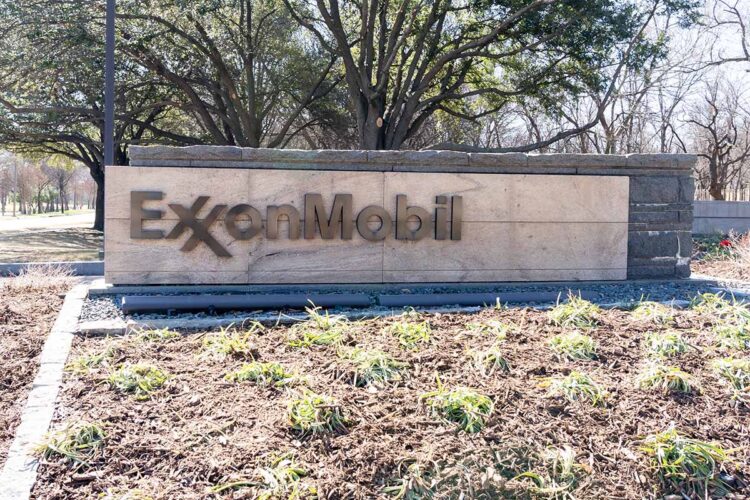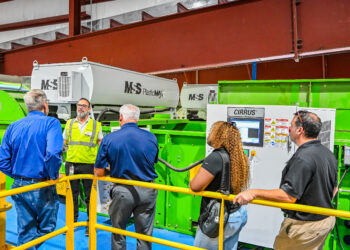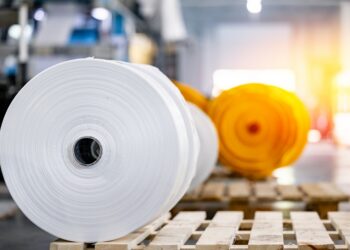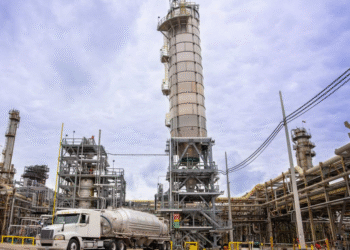Energy giant ExxonMobil is expanding its U.S. chemical recycling footprint, with 350 million additional pounds of capacity expected to start up in Texas in 2026.
The new ExxonMobil capacity is in addition to a 150-million-pound unit that started up in December 2022 and a second unit announced in May at the massive Baytown site in Texas, expected to start up in 2025. The most recently announced capacity will bring the company’s total U.S. plastic processing capacity to 500 million pounds per year by 2026, over a total of six units. The Baytown and Beaumont sites will each house 175 million pounds of the new capacity, with two new plants each.
As of last month, the Baytown site, the company’s only currently operational chemical recycling plant, had processed more than 70 million pounds of plastic scrap, according to a press release.
In addition to the new Texas capacity, the company is developing chemical recycling projects elsewhere in North America, as well as in Europe and Asia, toward its goal of building 1 billion pounds of annual recycling capacity globally by 2027. ExxonMobil had previously indicated that in addition to Beaumont, it was considering siting more recycling capacity in Baton Rouge, Louisiana; Joliet, Illinois; and locations in Belgium, the Netherlands, Singapore and Canada.
In December 2022, when the Baytown plant started up, executives said the company’s strategy was “design one, build many” and that a typical time frame for construction of such a plant was about 18 months, start to finish.
An ExxonMobil spokesperson said in a Nov. 25 email, “As we’ve ramped up the unit, we’ve evaluated what’s working and what to do better and how to manage feedstock quality and availability. Those lessons will be applied to the four new advanced recycling facilities.” The spokesperson did not clarify whether the four facilities included the two just announced.
ExxonMobil uses pyrolysis to break down hard-to-recycle plastics into their molecular building blocks, which can be used as feedstock for making virgin-quality polymers. The ExxonMobil spokesperson said “advanced recycling transforms plastic waste into raw materials that can be used to make many valuable products – from fuels to lubricants to high-performance chemicals and plastics.”
Chemical recycling, which is also called advanced recycling, remains controversial in the recycling industry. In September, a draft policy from the National Recycling Coalition included language stating that non-mechanical processes that convert plastics at the end of life into chemical fuels or fuel feedstocks do not meet the organization’s definition of recycling. NRC comprises multiple state and local recycling organizations.
In addition to packaging giant Amcor, which signed a PCR offtake agreement with ExxonMobil in 2022 and recently announced it would acquire Berry Global, ExxonMobil has chemical recycling customers in more than 15 countries across such sectors as food-contact packaging and pet food, according to the press release.
Cyclyx announces second processing facility
Feedstock for the existing ExxonMobil plant includes material sourced from Cyclyx, a joint venture between ExxonMobil, Agilyx and LyondellBasell. Cyclyx collects post-use plastics – including post-consumer, post-industrial and post-commercial – with its 10to90 community takeback program in Houston, and it’s building a feedstock preparation plant with expected startup in 2025.
On Nov. 26, Cyclyx announced it had made final investment decision on its second circularity center, to be located at an existing distribution center near Fort Worth, Texas, and expected to start up in the second half of 2026. Each of the two centers will process about 300 million pounds of scrap plastic feedstock each year, according to a press release.
The nation’s largest hauler, WM, also is building a new 144,000-ton-per-year materials recovery facility near Fort Worth, expected to open by the end of 2025.
Cyclyx supplies chemical recycling companies such as ExxonMobil and LyondellBasell, as well as mechanical recycling companies, with the plastic scrap.
The center will “help enable the aggregation and recycling of post-consumer, commercial and industrial plastic waste,” said Cyclyx CEO Joe Vaillancourt in the press release.
The three joint venture partners are investing a combined $135 million to fund construction and operations for the second center.
In its November investor update, Agilyx said it was raising funding for the second center. Agilyx also said the first Cyclyx plant was fully funded and construction was under way, with startup planned for October 2025.
The recently announced projects are among numerous recycling-related projects Texas has attracted with its expansive existing infrastructure, a robust energy industry and powerful business incentives. Financial support from the state and the U.S. Department of Energy also spurred Tennessee-based chemical company Eastman to proceed with its second methanolysis plant, to be located in Longview.
In addition, LyondellBasell is shutting down its Houston refinery in 2025 and is considering options for the site that include a chemical recycling plant.
Company, industry under scrutiny
Litigation has increasingly become the preferred tool to hold brand owners and huge corporations accountable for plastic pollution, as evidenced by lawsuits targeting Pepsico and the publication of a guide to pursuing legal avenues.
In September the California attorney general sued ExxonMobil, alleging that the company misled the public with its chemical recycling claims and polluted the state.
In an unusually fiery response to the lawsuit, ExxonMobil said in an emailed statement that “for decades, California officials have known their recycling system isn’t effective. They failed to act, and now they seek to blame others.
“Instead of suing us, they could have worked with us to fix the problem and keep plastic out of landfills,” the company stated.






























